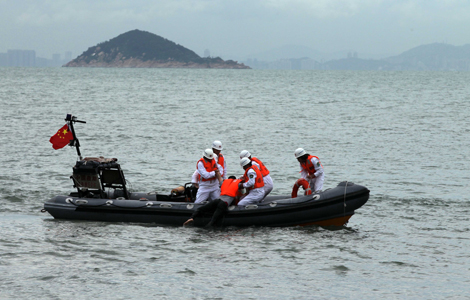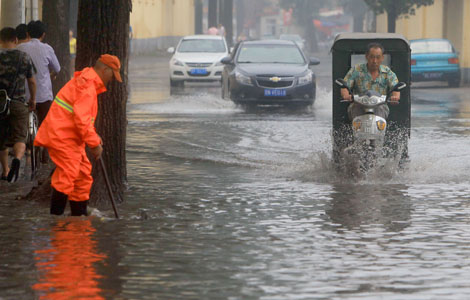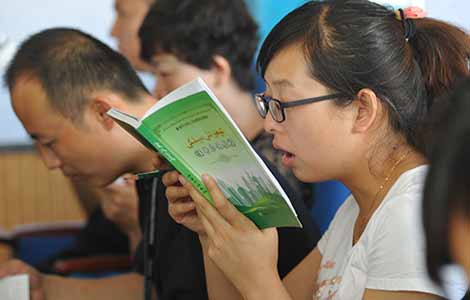Questioning China's real achievements
Updated: 2013-08-12 02:48
By Andrew Moody (China Daily)
|
||||||||
Sinologist's views unleash debate about the country's place in the world and how far it will finally advance
Is China emerging as a potential global superpower or just a partial one? The leading American Sinologist David Shambaugh makes the case in his new book, China Goes Global: The Partial Power, that despite being the world's second-largest economy, the country has a long way to go before it begins to shape the world in its own image.
Even in the economic sphere, where China arguably had its most significant influence — accounting for 40 percent of global growth over the past two decades as well as being the largest exporter and holder of foreign exchange reserves — its global reach is overstated, according to Shambaugh.
The American academic argues that while the image is of Chinese companies taking over businesses throughout Europe and the United States, China has only the fifth largest overseas direct investment in the world, behind even the Netherlands and a fifth of the size of that of the United States.
He further points out that while China may have 71 companies in the Fortune 500 only three of them are truly multinational, gaining more than 50 percent of their revenues from overseas.
China, according to the professor of political science and international affairs at George Washington University, is also a "cautious diplomatic actor", using diplomacy mainly as a tool to serve its own economic modernization and national security and not for any wider goals.
"China has a very long way to go before it becomes — if it ever becomes — a true global power. And it will never ‘rule the world'," he argues.
The book, coming from one of the West's leading Sinologists, is already fueling a debate about China's current and future role in the world.
Some in China insist it has never been China's intention to be a world superpower and that its sudden economic advancement has put it in a position of having to have a global role it never really sought in the first place.
Many believe Shambaugh also fails to give sufficient credit for the long and difficult journey China has taken since reform and opening-up began under Deng Xiaoping in the late 1970s.
In his book, the American Sinologist seems to take the polar opposite stance of the British academic Martin Jacques, who in his international bestseller When China Rules the World postulated that in the 21st century it might be China that defines modernity and not the United States.
Speaking from Kuala Lumpur, Jacques says the book is more about where China is now than where it is heading.
"It is a still photo. As a snapshot of the present he has got a lot to say and he has some very reasonable arguments but he underplays the scale of China's achievement.
"Where he really does underestimate China's strength is in the whole economic field. China is an absolutely crucial player and has become an important source of demand in the world not just for commodities but as a major consuming market in its own right.
"He talks of the number of Chinese companies in the Fortune 500 but if you look at how many companies there used to be in the list it has been such a huge change."
Paul M. Cheng, the Hong Kong politician and businessman, speaking from Hawaii, also believes Shambaugh has taken a snapshot and underestimates the global impact Chinese companies are likely to have over the next 10 to 15 years.
The author of On Equal Terms: Redefining China's Relationship with America and the West, another book that examined China's role in the world, says China's fast developing private equity market in Hong Kong, Shanghai and Shenzhen will give Chinese companies huge financial firepower to make acquisitions around the world.
They will be then be able to acquire the innovation capability and global brands that Shambaugh says the China economy now lacks.
"It is a fast track way for Chinese companies to do this. You can criticize them for not being able to do it themselves but from a business point of view it really makes no difference," he says
Cheng says Shambaugh is right to highlight that, according to the World Trade Organization, 93.6 percent of China's exports are still manufactured, often low-end, goods but fails to appreciate how much money it has made doing this.
"I know where he is coming from. A lot of Chinese companies just make OEM (original equipment manufacturing) products for other companies and are not very innovative in their own right," he says.
"That is fair comment but they are making a lot of money making these products and all this wealth they have accumulated will take them to the next stage."
Shi Yinhong, professor of international relations and director of the Center for American Studies at Renmin University and one of China's foremost foreign policy experts, says that many of the issues Shambaugh raises are central to the thinking of the Chinese government.
"I think much of this is fully compatible with Chinese leaders' own self-assessment. China has had a dramatic rise but there are a lot of weak spots, particularly internationally and also culturally. I think generally speaking it is a correct assessment that China is a partial power," he says.
Shi, who describes Shambaugh as his "good American friend" and with whom he has shared a number of conference platforms, says that with its rapid emergence, China still has work to do in building relations with the rest of the world, particularly its neighbors.
"I think China has focused too much on defining its relations with the United States in the past three to five years and has not paid enough attention to diplomatic relations with its Asian neighbors," he says.
"Within Chinese universities there is a lot of knowledge of the United States and also Japan but we need to focus much more on developing relations with countries such as Myanmar, India, Mongolia, South Korea and also nations in Southeast Asia. This is where we should build our influence."
Shambaugh argues that one of China's weaknesses is its failure to understand "soft power", a concept associated with Harvard University's Joseph Nye.
He says that China sees it as something that "can be bought with money or built with investment" with an estimated $7 to $10 billion spent per year on "overseas publicity work", according to the author.
James B. Heimowitz, who was hired to work on China's image during the Beijing Olympics when he was president and CEO for North Asia of public relations giant Hill & Knowlton, says attempting to buy soft power is not something that should be derided because it is precisely what a lot of companies do to improve their brand image.
"My view is that those people who have been successful in building their influence, or what is called ‘soft power', have put both resources and money behind it," he says.
"I think if China is putting money against this then it is certainly a step in the right direction. If they are a bit rough around the edges or not as nimble and sophisticated as others in applying that money then they will have to learn how to do it better — but to imply it can't be bought, I disagree."
Zhao Minghao, a research fellow of the China Center for Contemporary World Studies, the Communist Party of China think tank, does see a greater role for Chinese soft power in extending the country's influence in the world.
"Many people here talk about soft power. Even in the Party congress report and the government work report, there is reference to soft power. China has many resources for soft power and they have to find a way to use these resources. "Chinese traditional culture, philosophy, even Chinese food, which is universal like Coca Cola or KFC, is a form of soft power."
Jacques, a former editor of Marxism Today and deputy editor of The Independent in the UK, does not believe that China should be unduly concerned with this type of power.
"I think Nye is a greatly over-estimated writer. If you want to be a political or military power on a regional or a global basis then you must have economic power but there is always a lag," he says.
"Britain developed a huge empire and became a great naval power because it had the first industrial revolution. US economic development for more than a century after the American Civil War led to it becoming a superpower after 1945 when it ended its isolationism. The Soviet Union collapsed like a pack of cards after 1990 because it didn't have economic power to underpin its military strength."
He insists that real influence is nothing to do with selling McDonald's everywhere or having an international audience for Hollywood films.
"India has Bollywood but it doesn't make it a great power. It will be China's economic strength that will lead to it having real power and influence in the world since that is what ultimately matters," he says.
Heimowitz says how a country is viewed abroad need not be a barrier to its commercial success, something proved to some extent by the acceptance of Japanese products in China.
"I would say that Japan faced far greater challenges than China because it had to overcome deep-seated animosities in Asia and particularly in the China market.
"People, however, trust Japanese brands to deliver quality and they are willing to overlook whatever feelings they have toward Japan," he says.
Niall Ferguson, professor of history at Harvard University and author of Civilization: the West and the Rest, believes that China is on the way back to shaping the world.
"I think China is going to become the biggest economy in the world in a matter of less than 10 years and that this is an almost unstoppable outcome," he says.
"I don't think we are going back to 1411 (the height of China's Ming Dynasty (1368-1644) supremacy) because that would imply a massive economic preponderance of China but I think we are going to be living in a time where there will be real parity for the first time since the early modern period."
The best-selling British historian insists there is a complacency in the US about the rise of China. "People in Washington say (about China) that they need us as much as we need them so there is no problem. I say they are wrong.
"China needs the Americans much less than it did 10 years ago. China has a plan and it is no secret because they publish it to shift away from a reliance on exports to the West and toward more domestic consumption. There is no guarantee the Chinese will continue to fund the federal deficit," he says.
Some believe the relative slowdown of the China economy will actually give the Chinese leadership the time to more clearly think about China's role in the world.
Odd Arne Westad, professor of international history at the London School of Economics and author of Restless Empire, China and the World since 1750, says it could avoid having such a heavy responsibility placed on it too soon.
"The slowing down of the general hyper growth that China has been going through over the past 30 years is probably a good thing because it forces the Chinese leadership to think in a much more hard and sober way about what China is going to do internationally.
"With great-power status comes greater responsibility but it will now happen more gradually and it is a reminder that China's economic tree doesn't grow into heaven."
One area of the world where China has had global influence has been in Africa. Apart from a major trade relationship emerging, the Chinese have been a major actor in other ways. They have been responsible for building much-needed roads, airports, ports, hospitals and schools.
Jacques says that although China has been accused of economic colonialism in Africa, China has built influence there because it has a deeper understanding of the issues they face.
"China has gone through the development process itself and some areas of the country still have a per capita income similar to a number of countries in sub-Saharan Africa so I think there is a greater understanding," he says.
"The West on the other hand with its so-called Washington Consensus has tried to impose its own ideas on the continent, which has not proved successful at all and has been largely abandoned."
Professor Westad, also director of the LSE IDEAS foreign policy research center, insists there is not some grand overarching Africa strategy from the Chinese but that the relationship is driven by business.
"The Chinese business leaders I have spoken to believe there will be strong economic growth in Africa over the coming decades so to get involved for commercial reasons seems a very good idea.
"There isn't some clear Chinese State African policy. It is really about commercial development."
Kerry Brown, executive director of the China Studies Centre at Sydney University, believes Shambaugh's book says more about US' fears about China than it does about China's own issues.
"Throughout the book there lurks the shadowy sense that in the modern world, when we speak of China's dreams and hopes, we are also having to deal with American nightmares and fears," he argued in the Times Higher Education last month.
Brown believes when assessing China's influence in the world it is important to also take into account that the United States it has to deal with has changed since the terrorist attacks of Sept 11, 2001, and a Europe still dealing with the financial crisis.
"In that context, China has been as confused by how others have changed as it has been by the changes it has gone through itself."
Professor Shi at Renmin University reckons the financial crisis may be regarded as a historic turning point in 50 years because it was the beginning of US decline.
He insists, however, that we are not moving into an era where China will be a sole leader and have major influence over the rest of the world.
"I think we are going to move into a much more multi-polar world. China is not going to replace the United States as the dominant world power. The United States is going to experience relative decline but we are going to move into a much more multi-polar world where a number of countries have power and influence," he says.
Zhao, at the China Center for Contemporary World Studies, still believes the global institutions are still those that emerged in the aftermath of World War II and make it difficult for China to be a global leader.
Most Viewed
Editor's Picks

|

|

|

|

|

|
Today's Top News
Japan aims to carry out collective self-defense
Questioning China's real achievements
Go-between helped to cement key tire deal
Northeast China braces for major floods
The only way now is up
highs and lows of marine rescue
Beijing rainstorm cancels flights, kills airport worker
Showing her stuff to the folks at home
US Weekly

|

|











